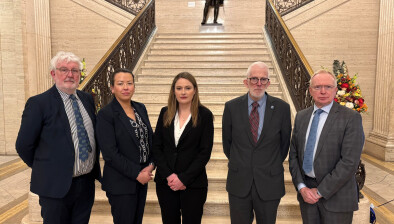Spiking and other offences to be extended to Northern Ireland

Naomi Long
Spiking and other new criminal offences being set to be introduced in Northern Ireland as well as England and Wales.
Naomi Long, the justice minister, has introduced legislative consent motions to allow some provisions of the UK government’s Crime and Policing Bill to be extended to Northern Ireland.
“Spiking is a despicable act that leaves victims feeling violated, vulnerable and confused,” she said.
“Whilst spiking can happen to anyone, it is predominately an attack against women and girls, and one which often goes unreported.
“I hope by making spiking an offence, it provides additional reassurance and protections to women and girls and will give victims the courage to report attacks to the PSNI.”
As well as the creation of a new spiking offence, other measures to be extended to Northern Ireland are:
- an offence of ‘cuckooing’;
- an updated offence of possession of advice or guidance relating to the creation of child sexual abuse images;
- strengthening and streamlining the current sex offender notification requirements (’sex offender register’);
- an offence of encouraging or assisting serious self-harm;
- offences relating to electronic devices for use in vehicle theft;
- reforms to the confiscation of the proceeds of crime;
- changes to proceeds of civil recovery costs and expenses;
- implementation of international law enforcement information sharing agreements; and
- criminal liability of bodies corporate and partnerships where senior manager commits offence (Identification Doctrine).
The Department of Justice has also said it is “engaging” with the Ministry of Justice on a recent amendment to the bill which would criminalise pornography depicting “acts of strangulation”.
The minister has also brought forward a legislative consent motion to have four measures in the Border Security, Asylum and Immigration Bill extended to Northern Ireland.
These concern the supply of trailer registration information; two offences relating to articles for use in serious crime; and an offence of breach of an interim serious crime prevention order.
The fourth measure is the responsibility of the Department for the Economy and relates to validation of fees charged in relation to qualifications.
Mrs Long said: “It is, of course, my preference to legislate for devolved matters through the Assembly.
“However, the extension of the provisions will ensure consistency across the UK in tackling certain types of criminality and provide important safeguards for victims.”











